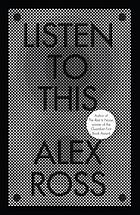Alex Ross - Listen to This
Alex Ross 2010. Listen to This. London: Fourth Estate, 366 pp.

First read this in 2011, returned to it regularly, in 2020 re-read the first 3 chapters, then Mozart, Esa-Pekka Solonen, Schubert, Verdi and the last, Blessed are the sad (Brahms). The table of contents:
Part I
- Listen to This: Crossing the Border from Classical to Pop
- Chacona, Lamento, Walking Blues: Bass Lines of Music History
- Infernal Machines: How Recordings Changed Music
Part II
- The Storm of Style: Mozart’s Golden Mean
- Orbiting: Radiohead’s Grand Tour
- The Anti-Maestro: Esa-Pekka Salonen at the Los Angeles Philharmonic
- Great Soul: Searching for Schubert
- Emotional Landscapes: Björk’s Saga
- Symphony of Millions: Classical Music in China
- Song of the Earth: The Arctic Sound of John Luther Adams
- Verdi’s Grip: Opera as a Popular Art
- Almost Famous: On the Road with the St. Lawrence Quartet
- Edges of Pop: Kiki and Herb, Cecil Taylor and Sonic Youth, Sinatra, Kurt Cobain
- Learning the Score: The Crisis in Music Education
- Voice of the Century: Marian Anderson
- The Music Mountain: Mitsuko Uchida at Marlboro
- The End of Silence: John Cage [this chapter not in my edition]
Part III
- I Saw the Light: Following Bob Dylan
- Fervor: Lorraine Hunt Lieberson
- Blessed Are the Sad: Late Brahms
The first chapter is autobiographical, the third a brief history of recorded music. The second, Chacona, Lamento, Walking Blues: Bass Lines of Music History is the thread that runs through the whole book, an original history of modern (Western) music traced from dance music of 16th century Spain and Peru (“music of the devil” according to contemporary report) to folk laments, to the Blues. Everything is in here, nearly. It isn’t the sort of thing I’ve ever seen attempted but there must be others. Tracing origins is always so interesting. Lacking such breadth of listening it is hard to appreciate all the elements, but not hard to enjoy and learn from it. Much supporting info including the author’s lectures and other supporting information including audio are at the author’s web site.
Every re-reading of this great book initiates a whole lot of re-listening too, seeking out new recordings. This time I filled in more gaps including the edge of the seat recording of Brahms Piano Concerto No. 1 by Clifford Curzon & George Szell which I had somehow missed until now, even though Barry Jones also put it at the top of his Brahms recommendations in The Shock of Recognition.
Also on the author’s web page is news of his next book Wagnerism; rush to get that when it comes out in Sept 2020.


